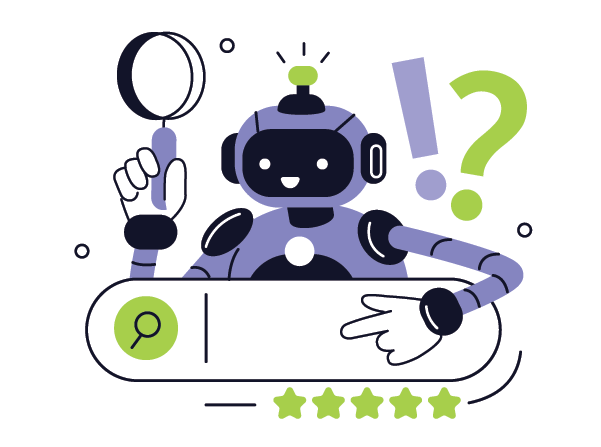Search is changing faster than ever. Not long ago, we all relied on the classic “10 blue links” from Google. You typed a question, hit enter, and got a list of websites. But now? Things look very different. Today, Google’s AI Overviews, ChatGPT, and tools like Perplexity don’t just list links—they summarize answers. And if your website isn’t part of that answer, you’re invisible.
That’s where “AI search optimization” comes in. It’s not about stuffing keywords or chasing algorithms anymore. It’s about making your site ready to provide clear, trustworthy answers. In this article, we’ll break down how small businesses can prepare, why it matters, and how Sequent helps companies like yours become the expert source that AI can’t ignore.
What Is AI Search?
AI search is the next step in how people find information online. Instead of showing a long list of links, AI search tools read the web and deliver a summarized answer. Think of it as having a personal assistant that checks 50 websites and hands you the best answer in one neat package. Pretty convenient for users. But it also means fewer people click on results—unless your content is the one being quoted.
For business owners, that’s both scary and exciting. Scary because your traffic could drop if you’re not prepared. Exciting because if you are prepared, your business can suddenly be the one everyone sees, even above the biggest competitors.
Why Small Businesses Should Care
Here’s the truth: AI doesn’t care about the size of your business. It cares about clarity, trust, and relevance. That means a small company in San Diego can outrank a national chain—if their content is more useful, better structured, and more trustworthy.
AI search is leveling the playing field. If you’ve ever felt drowned out by big-budget competitors, this is your chance to shine. The businesses that start optimizing now will be the ones winning tomorrow’s clicks, calls, and customers.
The Answer Framework: What AI Loves
So how do you make your website “answer-ready”? It starts with what we at Sequent call the Answer Framework. Simply put, AI search tools are hungry for three things: clarity, structure, and authority. Here’s what that looks like in practice:
- FAQs: AI loves clear, short answers to common questions. A strong FAQ page (like the one on your site right now) is pure gold.
- Process explainers: “How does roof repair work?” “What’s the process for filing taxes?” Step-by-step posts are ideal for AI.
- Comparisons: “Agency or freelancer?” “DIY vs professional?” Content that helps people choose is AI catnip.
- Pricing and transparency: Websites that talk about cost ranges openly tend to get quoted. Don’t hide behind “call for pricing.”
- Definitions and glossaries: Simple explainers—“What is responsive design?”—are perfect for being pulled into AI answers.
Notice a theme? Short, direct, helpful. That’s what works.

Technical SEO Still Matters (But It’s Evolving)
While content is king, technical SEO is still the castle it lives in. AI search doesn’t pull from messy, hard-to-read websites. It wants clean, structured, fast-loading content. Here’s what to focus on:
- Schema markup: Add FAQ, HowTo, LocalBusiness, and Review schema to make your content machine-readable.
- Headings: Format your subheadings as questions when possible. For example, use “How much does a website cost?” instead of “Website Pricing.”
- Page speed: If your site is slow, AI may pass you by. Speed equals credibility.
- Alt text and metadata: AI engines use context. Describe your images and fill in your meta descriptions with purpose.
Think of it this way: you’re not just optimizing for humans or Google anymore. You’re writing for the smartest reader on the planet—AI—and it likes things tidy.
Trust Signals and EEAT
Google and AI engines alike are obsessed with EEAT: Experience, Expertise, Authority, and Trust. The good news? Small businesses actually have a natural advantage here. You are the expert in your field—you just need to show it.
Ways to build EEAT into your site:
- Show your face: Add team bios, photos, and stories. People trust people, not faceless websites.
- Show your work: Share before-and-after examples, case studies, and client stories.
- Show proof: Display testimonials, reviews, and certifications.
- Stay fresh: Update your content regularly so it doesn’t feel outdated.
Bottom line: the more your site looks like a trustworthy expert resource, the more likely AI is to quote you.
Measuring Success in the Age of AI Search
Here’s a challenge: traditional analytics don’t always show the full picture anymore. If AI shows your content in a summary, the user may never click your site. But that doesn’t mean it wasn’t valuable.
So how do you measure success?
- Branded searches: Are more people searching your business name after being exposed to AI summaries?
- Leads and calls: Are you seeing steady or increased contact form submissions and phone calls?
- Mentions: Are AI engines pulling your answers into results? Tools like Ahrefs and Semrush can sometimes show this.
- Conversions: At the end of the day, sales and sign-ups matter more than raw clicks.
It’s a shift from measuring “traffic” to measuring “impact.”
How to Become Answer-Ready in 30 Days
If you’re ready to dip your toe into AI search optimization, here’s a 30-day action plan any small business can follow:
- Audit your content: Does it answer real customer questions, or just brag about your business?
- Add an FAQ section: Pick 10–12 real questions customers ask you and answer them clearly.
- Create one glossary page: Define key terms in your industry in plain English.
- Add trust signals: Testimonials, reviews, and team bios go a long way.
- Optimize your calls-to-action: Make sure when AI does send someone your way, they can easily call, email, or schedule with you.
None of these require advanced tech skills. They’re practical, quick wins that make a real difference.
The Sequent Advantage
Here’s where we come in. At Sequent, we don’t just build websites—we make them work in the real world. That means preparing your site not only for Google today but for AI search tomorrow. We build FAQ structures, implement schema, and design trust-driven layouts that position your business as the go-to expert in your space.
Think of us as your “AI search translators.” We take what you do best and package it so both humans and machines see you as the authority. The result? More visibility, more trust, and more customers.
Final Thoughts
AI search isn’t coming—it’s already here. Your customers are asking questions right now, and AI is answering them. The only question left is: will the answer come from your website, or from your competitor’s?
If you’re ready to make sure your business is the one in the spotlight, Sequent can help. Let’s make your website answer-ready—and future-ready.




